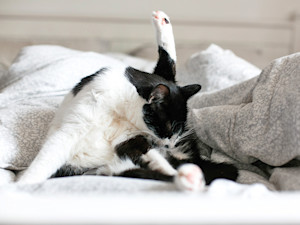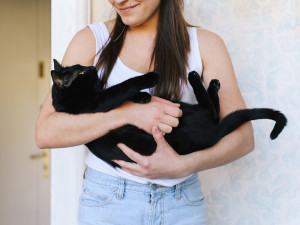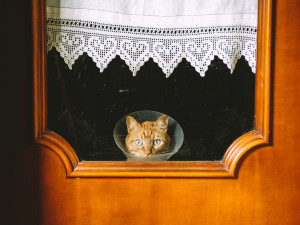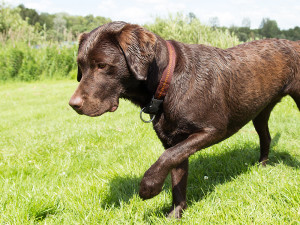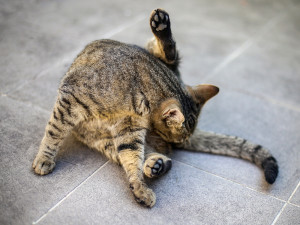Why Do My Cat’s Anal Glands Smell?
No, it’s not normal. Here’s what it means, and what you should do.
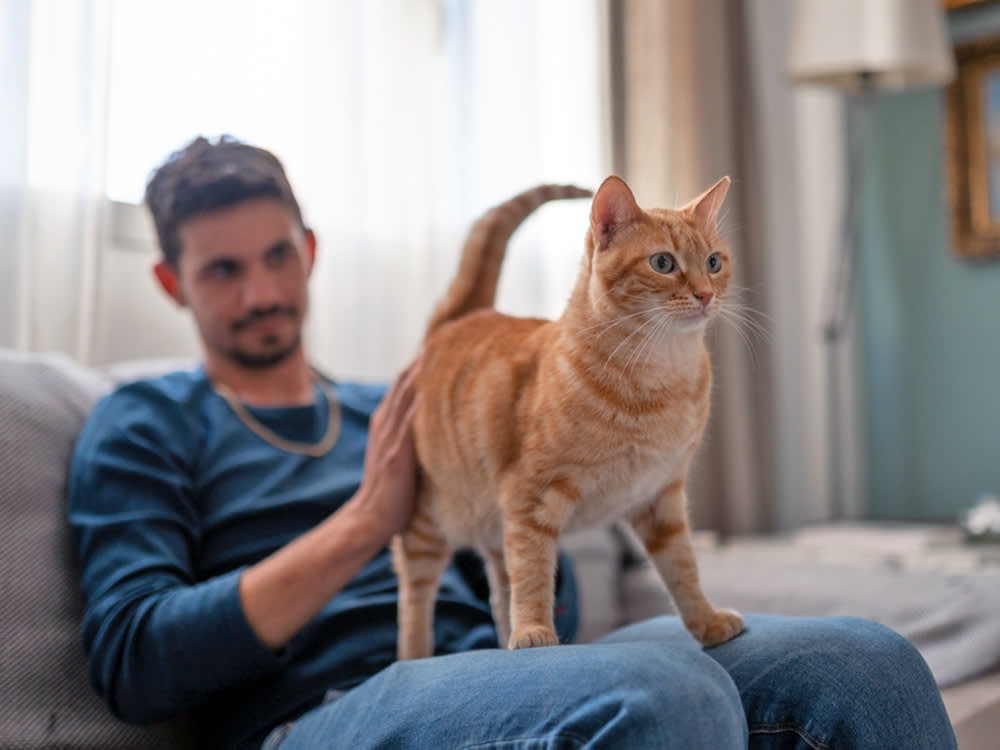
Share Article
In This Article:
Understanding Anal Glands in Cats Cat Anal Gland Problems Causes of Anal Gland Problems in Cats Identifying and Managing a Cat’s Anal Gland Smell Veterinary Treatment Options for Cat Anal-Gland Issues
Cats are generally thought of as clean creatures since they are self-groomers. Most cat parents never have to bathe their cats, yet they never smell bad. Therefore, if you suddenly notice a malodorous scent coming from your cat, you may not know what to think. If your cat is healthy, has no wounds, and hasn’t been into anything that has a foul odor, then the scent you’re smelling is most likely anal gland secretions.
This can be unsettling because typically, your cat’s anal glands secrete a fluid that you usually cannot smell. Read on for reasons why your cat may suddenly be starting to smell — and what you can do about it.
Main takeaways
It is unusual to smell feline anal glands.
Cat anal glands have a bad smell due to a mixture of compounds that act as scent markers.
Cats can develop various problems with their anal glands including impaction, infection, and abscesses.
Causes of the problems include diet, obesity, poor hygiene, bacteria, and tumors.
There are multiple signs of anal gland abnormalities, and treatment is specific to the cause.
Understanding anal glands in cats
If you’ve been a dog parent, you may know all about anal glands. But while dogs frequently have problems with their anal glands, it’s rare for a cat to have an issue. In fact, you probably have no idea what to do — so we’re here to help.

What are anal glands?
Anal glands are two small sacs located on both sides of a cat’s anus, usually at the four o’clock and eight o’clock positions. These glands typically cannot be seen because they are just inside the rectum. However, you may see duct openings from glands through the skin. The glands contain a thin, clear, pale yellow or brown fluid typically discharged when a cat has a bowel movement. When they are healthy, you won’t smell the fluid.
The purpose of the discharge isn’t fully understood. However, it seems likely that our cats’ ancestors secreted the fluid to communicate with other felines or mark territory. Today, these glands and their secretions are essentially useless in domesticated kitties.
Why do anal glands smell?
A cat’s anal gland secretions have an unpleasant smell due to the oily substances and a mix of proteins, fatty acids, and other compounds that acts as scent markers. The purpose of the secretions is probably to communicate with other felines and mark territory. If your cat is healthy, you are not going to notice this odor except perhaps during defecation or moments of stress. However, if there is a persistent, intense foul odor, your veterinarian should check the glands. The glands could be impacted, infected, or abscessed.
Cat anal gland problems
Your cat may never have a problem with their anal glands. However, occasionally issues arise, including inflammation, infection, tumors, impaction, or abscesses. In all of these cases, you’ll need to take your cat to the vet, sooner than later.
Anal gland inflammation
Anal gland inflammation, also known as anal sacculitis, is characterized by swollen and irritated anal glands. There may also be a particularly foul odor. Causes can include blockage, infection, or injury. This condition is very uncomfortable in cats and can even lead to an abscess. A vet visit is needed right away.
Anal gland infection
A cat anal gland infection can occur when bacteria from the rectum enter the gland through the duct. The bacteria can multiply, and the fluid becomes thicker, even to the point of an impaction.
Anal gland tumors
Cat anal-gland tumors are rare but do occur. They can be benign or malignant, with adenocarcinoma being the most common type of malignancy. You will see the tumor as a swelling near the anus. Treatment can include surgery, chemotherapy, or radiation. Early detection and treatment leads to better outcomes.
Impaction and blockage
Impaction and blockage of anal glands in cats occur when the glands fail to empty naturally, causing secretions to build up and thicken. Impacted anal glands can become swollen and painful and require prompt veterinary attention.
Abscess
Due to the anal gland duct emptying into the rectum, bacteria from the rectum can ascend into the anal gland, multiply, and lead to infection. The gland can abscess if the infection becomes severe, and the secretions thicken and block the duct. The abscess will have to be lanced by the vet if it hasn’t already ruptured. Your vet will then prescribe antibiotics and anti-inflammatories.
Causes of anal gland problems in cats
Most of the time, in most cats, anal glands work well and do not have problems. But some conditions can arise with anal sacs. These include impaction (blockage), infection, and possible abscess. Among the causes that can lead to these problems are poor hygiene, obesity, soft stools, and poor diet.
Low fiber diet
Feeding your cat a low-fiber diet can sometimes be a cause of anal gland problems. If there is insufficient fiber in the diet, the stool may need to be bulkier to put enough pressure on the glands to express them naturally.
Obesity
Extra weight in a cat can impair the natural emptying of the anal glands. Excess body fat can reduce mobility and limit a cat’s ability to groom themselves properly, which may lead to unnoticed discomfort in the anal area. Additionally, obesity often results in softer or irregular stools, which do not provide sufficient pressure to help express the anal glands during defecation.
Poor hygiene and diet
Inadequate grooming, which can occur with obese or arthritic cats, can lead to irritation or infection around the anal area. It is important to regularly check your cat’s rear end to ensure it isn’t soiled. In addition, a diet that’s too low in fiber, or any cause of chronic soft stool, can prevent the stool from being bulky enough to put pressure on the anal glands to expel the secretions.
Identifying and managing a cat’s anal gland smell
If you are suddenly smelling a foul odor coming from your cat, it could be ear or mouth problems. But it also could be anal gland issues. How do you tell?
Recognize signs of anal gland problems
Cats are quick to hide their illnesses. However, anal gland problems can be so uncomfortable that they can’t help but show you they are in pain. You’ll need to spot the behavioral symptoms and visual signs.
Behavioral symptoms
Scooting, or dragging their rear end along the floor
Excessive licking or biting to groom the anal area
Restlessness or irritability, or avoiding being touched near the hindquarters
Straining or showing signs of discomfort while using the litter box
Meowing or crying, especially when the area is touched
Frequent trips to the litter box to relieve discomfort
Visual signs
Swelling near the anus
Redness of the skin in the anal area
Visible discharge from the anus that is clear, yellow, brown, pus-colored, or blood-tinged opens in new tab
Scabs or sores near the anal region
Dirty or matted fur around the anal area
If you observe any of these behaviors or visual signs, it’s time for a vet visit.
Preventative measures for anal gland health
Even if your cat has never had an anal gland problem, the following are steps you can take to prevent problems from occurring.
Diet and nutrition can play a large part in maintaining the health of a cat’s anal glands. A well-balanced diet rich in fiber, so the stools will be bulky enough to press on the anal glands during defecation, can keep the glands empty.
Avoiding excess weight will help your cat keep their anal area clean.
Regular vet checkups are essential, annually or bi-annually
Prevention is always better than treatment. Follow the tips above to ensure your cat does not develop an anal gland issue.
Home remedies and cleaning
If your cat is overweight, arthritic, or has very long fur, there are actions you can take at home to help keep the rectal area clean and prevent anal gland problems.
Home remedies
Increase the fiber in your cat’s diet by adding a small amount of canned pumpkin or psyllium husk.
Provide fresh water and consider wet food to support digestive health.
Give your cat omega-3 supplements to reduce inflammation.
Cleaning the rectal area
If the rectal area appears dirty or soiled, gently clean it with a warm, damp washcloth or unscented, pet-safe wipes.
Apply a warm, damp cloth for a few minutes to soothe discomfort or swelling.
Check for signs while cleaning, such as redness, swelling, or discharge that might indicate an issue requiring veterinary attention.
Never try to expressopens in new tab your cat’s anal glands unless your veterinarian has instructed and trained you to. You can harm yourself and your cat.
Regular grooming and maintaining a clean litter box can also help keep the area hygienic and reduce the risk of anal gland problems. If your cat is showing signs of an anal gland problem, it is best to see your veterinarian instead of diagnosing the problem yourself.
Veterinary treatment options for cat anal-gland issues
Professional expression of anal glands
If your cat has impacted anal glands, your veterinarian can safely express the contents by gently applying pressure to each gland through the anus. This ensures proper emptying without causing injury or infection. In some cases, if the glands are severely impacted, the veterinarian may need to flush them or administer medications (such as antibiotics) to address infection or inflammation.
Medical interventions for recurring problems
In many cases, there are additional steps your vet must take in addition to expressing the anal glands.
Manual expression: Regularly expressing the glands to prevent impaction or infection.
Flushing and antibiotics: For chronic infections or severe blockages, your vet may flush the glands to remove debris, followed by antibiotics to treat or prevent infection.
Dietary recommendations: The vet might suggest a high-fiber diet or specialized cat food to promote healthy digestion and natural gland expression.
Anti-inflammatory medications: These can help reduce swelling and discomfort in cases of ongoing inflammation.
Surgical removal (anal sacculectomy): In extreme or recurring cases where other treatments are ineffective, the vet may recommend surgically removing the anal glands. This is a last resort option due to potential risks, such as nerve damage.
Treating underlying conditions: Identifying and addressing issues such as obesity, allergies, or digestive problems that may contribute to anal gland dysfunction.
It is possible to prevent your cat from developing recurring problems if you follow the preventative tips above.
FAQs
How do you know if your cat needs their glands expressed?
You may know that your cat needs their anal gland expressed if they are exhibiting unusual behavioral signs (such as excessive licking or biting, irritability, crying) and visual signs (such as anal swelling, redness, discharge, sores). Your cat may also smell unusual or just unpleasant.
Why does my female cat smell fishy?
“Fishy” is the description many people use to describe the odor of anal gland secretions. It doesn’t always mean there is a problem: Your kitty may discharge their anal glands if surprised or frightened. However, this does often indicate a problem, especially if accompanied by behavioral and visual signs. You may need to make an appointment with your vet.
Resources
Corbee, Ronald Jan, et al. “A Cross-Sectional Study on Canine and Feline Anal Sac Disease.” Animals, vol. 12, no. 1, 31 Dec. 2021, p. 95, www.ncbi.nlm.nih.gov/pmc/articles/PMC8749694/, https://doi.org/10.3390/ani12010095opens in new tab.
Frankel, Jessica L., et al. “Gross and Cytological Characteristics of Normal Feline Anal-Sac Secretions.” Journal of Feline Medicine and Surgery, vol. 10, no. 4, Aug. 2008, pp. 319–323, https://doi.org/10.1016/j.jfms.2007.12.006opens in new tab. Accessed 26 July 2021.
Nývltová-Pírková, Ivana, et al. “Ultrasound Morphology of Presumed Normal Anal Sacs in Dogs and Cats.” Animals, vol. 14, no. 11, 5 June 2024, p. 1684, www.mdpi.com/2076-2615/14/11/1684, https://doi.org/10.3390/ani14111684opens in new tab. Accessed 7 Dec. 2024.
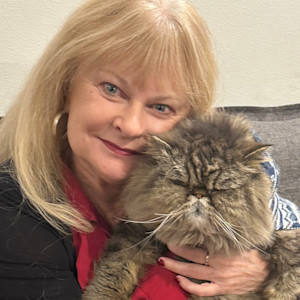
Dr. Shelby Neely, DVM
Dr. Shelby Neely is a freelance writer and veterinarian who graduated from the University of Pennsylvania School of Veterinary Medicine and has practiced veterinary medicine for 30 years, specializing in small animals. Her work has appeared in Allivet, AsktheCatDoctor, WhiskerDocs, Ask the Cat Doctor Radio, Ask the Cat Doctor TV, and numerous other websites, brochures, newsletters, newspapers, and ebooks. In her spare time, Dr. Neely likes to spend time with her three children, two grandchildren, three cats, two grand-cats, and five grand-dogs.
Related articles
![cat with cone after vet visit]()
How Often Should You Take Your Cat to the Vet?
Get thy cat to a vet, even if it’s a struggle to get them out the door.
![Brown Labrador lifting front leg]()
How to Get a Head Start on Your Pet’s Health
Spot lumps, limps, and lethargy early on.
![Cat looks at their butt]()
Why Is My Cat Bleeding From Their Anus?
It’s not a pretty problem to have, but it’s important to know how to treat this condition.
![Man holds small kitten in his hands.]()
Best Kitten Dewormer
Because the early bird isn’t the only one who gets the worm(s).

